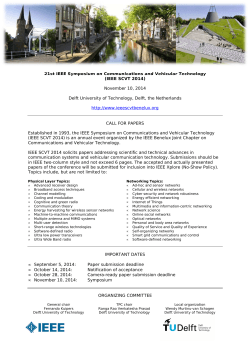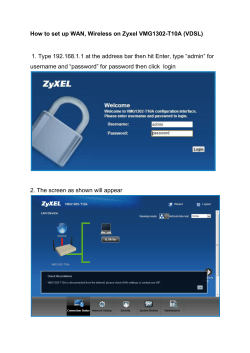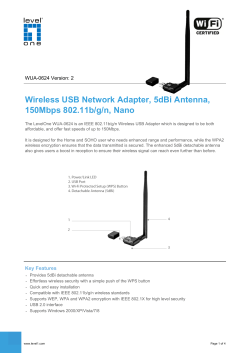
Call for Papers - ieee globecom 2015
Workshop on Wireless Attocell Communications http://oucsace.cs.ohiou.edu/~dditomas /workshop/2015/Frameset.html ORGANIZING COMMITTEE David W. Matolak University of South Carolina, USA Avinash Kodi Ohio University, USA Savas Kaya Ohio University, USA TECHNICAL PROGRAM COMMITTEE David W. Matolak University of South Carolina, USA Avinash Kodi Ohio University, USA Savas Kaya Ohio University, USA Kathleen Melde University of Arizona Baris Taskin Drexel University Josep M. Jornet University of Buffalo Murat Yuksel University of Nevada, Reno IEEE Globecom 2015 Workshop on Wireless Communications for Attocells: Wireless Networks on Chips, Chip-to-Chip, and Board-toBoard In conjunction with IEEE Globecom 2015 San Diego, CA, USA 6-10 December 2015 Call for Papers As technology scales into the nanometer regime, growth in the density of transistors per unit area has accelerated the proliferation of the number of cores integrated onto the same die. Aggressive technology scaling and increased demands from High-Performance Computing (HPC) applications are driving the design of chip multiprocessors for workstations, servers and datacenters. As technology scaling is paving the way to harness enormous computing power on the chip, the design of the interconnection network—which acts as the glue that connects all the discrete components (cores, chips, DRAM, and I/O)—is becoming an important challenge from both the bandwidth and energy perspectives in future HPC systems. Emerging technology such as wireless interconnects may provide an alternate communication medium for solving the pin-limited bandwidth and frequency-limited power constraints of electrical (wired) interconnects. Wireless interconnects have several unique advantages that make them ideal candidates for short range (attocell) off-chip communication in energy and bandwidth constrained environments, including: (1) easy integration with traditional complementary-metal oxide semiconductor (CMOS) circuits; (2) multiple degrees of freedom in the spatial, temporal and frequency domains; and (3) reconfigurability to connect different transceivers, which can both increase the data rate as well as improve network latency. Although there are other emerging technology candidates for off-chip communication with similar benefits, such as photonics and 3D integration, wireless technology offers the maximum number of degrees of freedom, and can effectively integrate heterogeneous cores and hybrid memory (DRAM, MRAM, PCM), while requiring minimum system redesign across HPC applications. The workshop topics will be communication for attocell-scale systems, which encompasses wireless networks on chips (WiNoCs), chip-to-chip, and board-to-board communications, with link distances spanning from a few centimeter to meters. The primary application for these communication systems is HPC interconnections. Hence this research requires coordinated expertise across multiple areas, including physical and medium access communications, computer architecture, and transceiver device technology. Both fundamental research and industrial development and their reduction to practice will be addressed. The IEEE Globecom 2015 Workshop on Wireless Communication for Attocells (WCA) will consist of invited presentations, regular papers, and a concluding panel and open discussion concerning attocell communications for HPC. IMPORTANT DATES Submit papers for review by: 1 July 2015 Acceptance/rejection announcement: 1 September 2015 Final workshop papers due: 1 October 2015 Papers submitted to the IEEE Globecom 2015 WCA Workshop must represent original material that is not currently under review elsewhere, and has not been previously published. All papers will be peer-reviewed by members of the technical program committee and other experts active in the field to ensure high quality and relevance to the workshop. Paper length should be no more than five (5) pages, a maximum of one (1) additional page will be allowed for an additional page charge for publication of the camera-ready version. Please use the manuscript template provided by IEEE to ensure that your submission is correctly formatted. Papers must be submitted in PDF format through the EDAS conference system by selecting the “Globecom’15 - Workshop” “Submit” link at the EDAS paper submission website and then selecting “IEEE Globecom’15 Wireless Communication for Attocells in High Performance Computing Workshop.” Accepted papers will appear in the IEEE Globecom workshop proceedings and will be included in IEEE Xplore. At least one of the authors of accepted papers must attend the workshop to present their paper. Papers must be submitted no later than 1 July 2015. Questions related to the paper submission process should be directed to matolak@cec.sc.edu, kodi@ohio.edu, or kaya@ohio.edu with subject line “Globecom ‘15 workshop submission question”.
© Copyright 2025


![[WCR-300S] How to Change the Wireless Network Name(SSID)](http://cdn1.abcdocz.com/store/data/000232989_1-c13ffbaf9a88e423608ef46454e68925-250x500.png)






